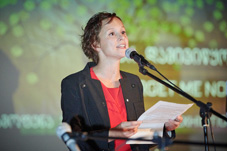
Twenty-three grieving families given relief. You can help us do more.
Friday, March 15
Nino’s brother. Giorgi’s father. Liana’s husband. Roman’s son*. They all went missing during the conflicts of the 1990s and 2008. For years, family members lived in uncertainty, hoping for a sign of life, while also thinking about their possible death.
There was never tangible proof either way. Now, though, they know.
Twenty-three individuals who disappeared during the armed conflicts have been identified after research, excavations and thorough scientific analysis. Their remains will be handed over in the coming days to family members, who can now organize a ceremony and a dignified burial.
Georgia is one of the rare places in the world today where, even though past conflicts have not been resolved, families are getting answers about their missing loved ones.
This is possible only thanks to a purely humanitarian track, in which the former sides to the conflicts actively engage, bring forward information, and support the organization of exhumations. Two coordination mechanisms -- one gathering Abkhazians and Georgians; the other one Georgians, Russians and South Ossetians -- have been functioning since 2010, meeting twice yearly in a process facilitated by the International Committee of the Red Cross acting in its neutral intermediary capacity.
All sides follow the same spirit in their dialogue with each other: what matters is to bring answers to the families, without ethnic or political considerations, without any legal investigation into the who and the how of the disappearances.
We at the ICRC believe that this process, which is already bringing results, could be even more successful; many more of the over 2,300 families still waiting for answers about their missing loved ones could get the peace of mind the families of the 23 individuals are experiencing this month.
We believe this is the right time to increase efforts to make this happen.
Clarifying the fate of people who go missing in armed conflicts is a legal obligation for the Parties or ex-Parties to those conflicts per International Humanitarian Law. At the same time, it is a sensitive and complex process, which requires time, commitment and persistence from all involved.
One of the biggest obstacles today in the search for the missing persons is the lack of information about potential gravesites where people would have been buried during the conflicts. To help this along, as well as to achieve significant progress in addressing the needs of the families of the missing, we see two key steps to be fulfilled.
The first is the setting up of a body within Georgia’s government to coordinate the work on the search for the missing and support to the families, similar to “Missing Commissions” that exist in Bosnia Herzegovina, Colombia and Sri Lanka. For the families in Georgia this body would be the entry point for their requests, the recognition of their “right to know”, as well as an additional enactment of the commitment of the Georgian authorities to make all efforts to clarify the fate and whereabouts of the missing persons, an obligation enshrined in the Geneva Conventions of 1949.
Second, people who know need to come forward. Witnesses might not know that their account is crucial for ending the suffering of the families of the missing, and that there is a process in place to handle this information in a confidential and purely humanitarian manner. As well, we believe that not all cases of missing persons have been reported yet to us, which has a direct consequence on the possibility to identify the remains that are recovered. This type of information is also crucial. We thus encourage individuals with information on missing persons or possible gravesites to reach out to us; any information we receive will be handled in a confidential manner and used exclusively for the purpose of this humanitarian program.
The families of those who have gone missing have always sought ways to heal. They have organized themselves into committees and associations, creating a network of peers suffering the same tragedy who can vocalize their situation and needs. One aspiration is for public recognition and commemoration of their missing relatives. Monuments dedicated to the disappeared have been erected in several towns such as Batumi, Kutaisi, Zugdidi, Gori and one is about to be built in Tbilisi.
The majority of the families also expressed the need to know the fate and whereabouts of their loved ones, and to receive their remains if found. This led the ICRC to launch an extensive forensic humanitarian program of search, excavations and identification, the biggest today for our institution worldwide. Since 2011, the human remains of 508 people were recovered from various gravesites; drawing on ICRC and local specialists’ expertise, 178 of them have been identified so far.
This was achieved with the close cooperation of all sides, and the results are reassuring. However, time is passing and the relatives of those who are still missing are emotionally exhausted. The mothers and fathers, wives and sisters are getting old.
“They say time heals, but for me it’s totally the opposite. The more years go by, the worse my condition becomes. Terrible thoughts come to my mind and I can hardly bear the expectation and uncertainty,” one sister of a missing person told us.
We at the ICRC are encouraged that by facilitating the identification of the remains of 23 more people, we, together with the institutions involved, are helping end some of the uncertainty; however, we do hope for additional support in these efforts to do even more for the hundreds of other families who are still waiting for answers.
Severine Chappaz
Head of the International Committee of the Red Cross (ICRC)
Delegation in Georgia
*The names are changed in order to respect the privacy of the concerned families.


